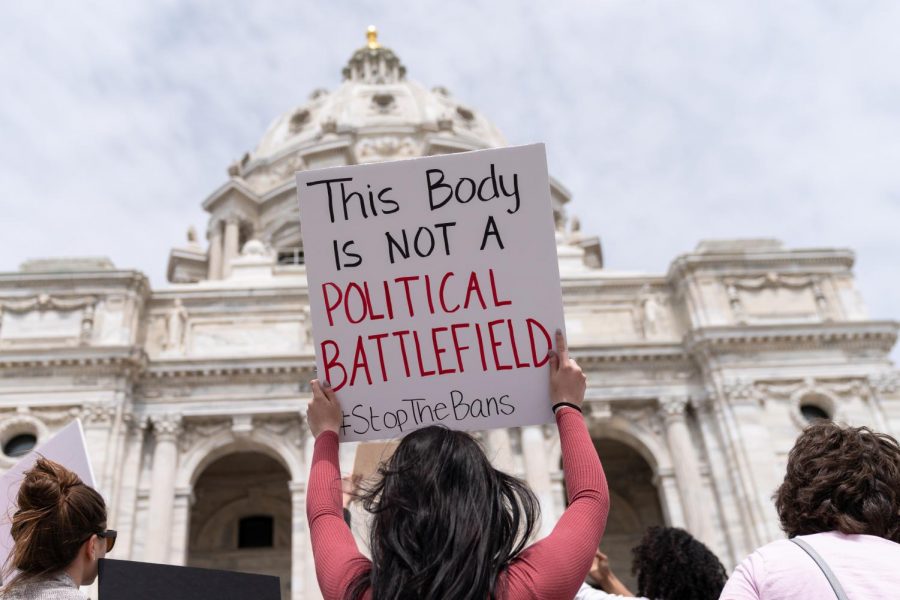The idea that politics is cyclical is not a new one. With the progression of time, certain issues re-establish themselves as central topics of discussion.
Despite the polarizing nature of the issue of abortion, the political pendulum regarding this topic continues to swing, begging the question: when will the cycle end?
On Sept. 1, to the dismay of many, Texas passed a law banning abortions as soon as cardiac activity is detected, which is around six weeks into pregnancy–at which time many women are not even aware that they are pregnant.
Further, the law allows private citizens to sue anyone who helps a woman get an abortion past six weeks. Perhaps the most shocking element of this new law is that it makes no exceptions for rape or incest.
As strict as this abortion ban is, Texas is not the first state to attempt to pass such a law. In 2020, Georgia also attempted to pass a ban on abortions after six weeks, but the law was ultimately declared unconstitutional because it was in violation of Roe v. Wade. What differentiates Texas’s ban from others is the fact that it is dependent on individual enforcement, not that of public officials.
NPR National Correspondent Sarah McCammon explained in an article how individual enforcement would work in practice. “Anyone who successfully sues an abortion provider under this law could be awarded at least $10,000,” she explained. “And to prepare for that, Texas Right to Life has set up what it calls a ‘whistleblower’ website where people can submit anonymous tips about anyone they believe to be violating the law.” This factor makes the law particularly difficult to challenge in federal courts, but nevertheless, several lawsuits are still underway.
Certain demographics will be disproportionately affected by this new law, as well. While many in support of the ban will claim that its intention is to protect unborn babies, the effects of this law point to a much darker truth.
A research brief from July of 2021 by the University of Texas at Austin’s Texas Policy Evaluation Project reported that the law “would particularly affect Black patients and those living on low incomes or who live far from a facility that provides abortion because they often experience delays obtaining care.”
The law will also hit young people, members of the LGBTQ+ community, disabled people, immigrants and other marginalized groups especially hard. Individuals belonging to these communities already struggle to find resources to get abortions, and this law acts as yet another barrier.
It is easy to pretend as though this new law is a distant issue and remain unbothered. However, Texas has set a clear precedent with this law, meaning that similar laws could be pushed in other conservative states like Iowa.
Some students fear the implications of a similar law in Iowa. Senior Sidney Brockmann shared, “I don’t believe there are any benefits to this law in any way. Only negative things come out of it as it just causes more concern for women as they fear the idea of not having control over their bodies,” she said. “I feel as though this law is just another way for conservatives to invoke fear in women to scare them away from making their own choices when it comes to their body.”
However, other students are not as opposed to the ban. Senior Megan Schiltz said, “Personally, I do think that a law similar to the abortion law in Texas would be beneficial in Iowa. I think that the only exceptions, or changes, should be in instances of rape.”
Reporter Katie Akin of the Iowa Capital Dispatch expanded on the possibility of a similar law in Iowa. “‘I would anticipate a copycat law,’ said Jamie Burch Elliott, public affairs director for Planned Parenthood Advocates of Iowa. Burch Elliott noted that several previous Iowa laws on abortion, including mandatory waiting periods and a fetal heartbeat law, were proposed first in other states, including Texas. ‘Texas seems to start it, and then eventually things make their way up to Iowa,’ she said.”
Despite the varied consensus regarding this law, the undeniable truth is that it will have national implications.
This is not an out of sight, out of mind issue, and it is the job of Americans–of Iowans–to pay attention to seemingly distant issues because they, too, could fall victim to the cyclical nature of politics.









